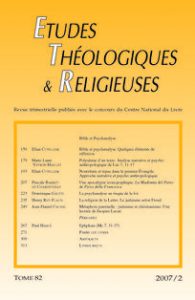Henri Rey-Flaud considère que le Moïse de Freud présente une genèse inédite du judaïsme, appréhendé comme aboutissement des différentes métamorphoses de l’écriture qui ont marqué l’histoire de l’humanité. Il montre en effet que dans cette conception, la remise et le bris des Tables de la Loi, suivis du meurtre du Prophète, vont susciter l’émergence d’une Lettre pure, impossible à inscrire et donc à lire, fondatrice d’une croyance hors représentation qui conféra aux Juifs une place d’exception dans la culture. En retraçant les étapes de ce processus il note que la subversion de la Lettre, accomplie quand celle-ci dotée d’un contenu devient l’expression de la volonté explicite de Dieu, marque, selon Freud, la fin du judaïsme spirituel.
For Henri Rey-Flaud, Freud’s Moses offers a new account of the genesis of Judaism conceived as an achievement of the various metamorphoses of writing which have borne their imprint on humanity’s history. He argues that the gift and shattering of the Tables of the Law, followed by the murder of the Prophet, gave rise to a pure Letter, one that could neither be written nor of course be read, and thus founding a belief eluding representation which granted the Jews an exceptional place in culture. Retracing the different stages of this process, Rey-Flaud notes that according to Freud the subversion of the Letter, accomplished when being given content thereby becoming the expression of the explicit will of God marks the end of spiritual Judaism.
p. 235-247
Auteur
REY-FLAUD Henry
Henri REY-FLAUD, psychanalyste, est professeur de littérature et de psychanalyse à l’Université Paul-Valéry (Montpellier III).
